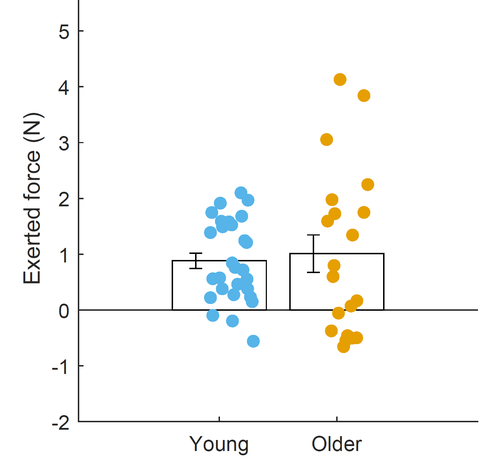
RANGANATHAN Rajiv
- Kinesiology, Michigan State University, East Lansing, United States of America
- Meta-Science in Health & Movement, Rehabilitation, Sensorimotor Control
- recommender
Recommendation: 1
Reviews: 0
Areas of expertise
motor learning, rehabilitation
Recommendation: 1
06 Mar 2024


Not fleeting but lasting: Limited influence of aging on implicit adaptative motor learning and its short-term retention
Does aging affect implicit motor adaptation?
Recommended by Rajiv Ranganathan based on reviews by Kevin Trewartha and Marit RuitenbergMotor adaptation to environmental perturbations (such as visuomotor rotations and force fields) is thought to be achieved through the interaction of implicit and explicit processes [1]. However, the extent to which these processes are affected by aging is unclear, partly because of differences in experimental protocols. In this paper, Hermans et al. [2] address the question of whether the implicit component of learning is affected in older adults.
Using a force-field adaptation paradigm, the authors examine implicit adaptation and spontaneous recovery in healthy young and older adults. Overall, the authors found that both total adaptation and implicit adaptation was not affected in older adults. They also found evidence that spontaneous recovery was associated with implicit adaptation, but was not affected in older adults.
These results are noteworthy because they challenge some prior work in the field [3], but are also consistent with results from other experimental paradigms [4]. A main strength of the current paper is the rigor applied to testing this question. The authors provide robust, converging evidence from multiple analyses and statistical methods, and control for confounds both statistically and experimentally.
Readers might want to note that this is a ‘conceptual’ replication of the previous study [3], and there are some potentially important differences in experimental details, which are clearly outlined. The sensitivity of the findings to such experimental parameters needs further testing. More broadly, these results highlight the need for greater understanding of how age differences observed in other motor learning tasks [5] are reflective of deficits in learning mechanisms.
References
1. Taylor, J. A., & Ivry, R. B. (2011). Flexible cognitive strategies during motor learning. PLoS computational biology, 7(3), e1001096. https://doi.org/10.1371/journal.pcbi.1001096
2. Hermans, P., Vandevoorde, K., & Orban de Xivry, J. J. (2024). Not fleeting but lasting: Limited influence of aging on implicit adaptative motor learning and its short-term retention. bioRxiv, ver.2, peer-reviewed and recommended by PCI Health & Movement Sciences. https://doi.org/10.1101/2023.08.30.555501
3. Trewartha, K. M., Garcia, A., Wolpert, D. M., & Flanagan, J. R. (2014). Fast but fleeting: adaptive motor learning processes associated with aging and cognitive decline. The Journal of neuroscience : the official journal of the Society for Neuroscience, 34(40), 13411–13421. https://doi.org/10.1523/JNEUROSCI.1489-14.2014
4. Vandevoorde, K., & Orban de Xivry, J. J. (2019). Internal model recalibration does not deteriorate with age while motor adaptation does. Neurobiology of aging, 80, 138–153. https://doi.org/10.1016/j.neurobiolaging.2019.03.020
5. Voelcker-Rehage, C. (2008). Motor-skill learning in older adults—a review of studies on age-related differences. European review of aging and physical activity 5, 5–16. https://doi.org/10.1007/s11556-008-0030-9